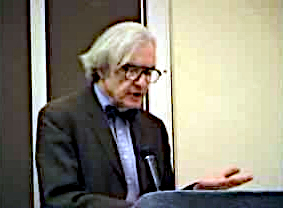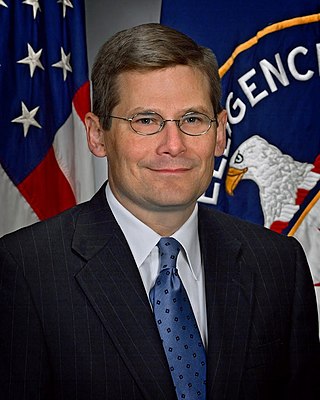Related Research Articles

Robert Jay Lifton is an American psychiatrist and author, chiefly known for his studies of the psychological causes and effects of wars and political violence, and for his theory of thought reform. He was an early proponent of the techniques of psychohistory.

Leon Edward Panetta is an American retired politician and government official who has served under several Democratic administrations as Secretary of Defense (2011–2013), director of the CIA (2009–2011), White House Chief of Staff (1994–1997), director of the Office of Management and Budget (1993–1994), and as a U.S. Representative from California (1977–1993).

Donald Ewen Cameron was a Scottish-born psychiatrist. He is largely known today for his central role in unethical medical experiments, and development of psychological and medical torture techniques for the Central Intelligence Agency (CIA). He served as president of the American Psychiatric Association (1952–1953), Canadian Psychiatric Association (1958–1959), American Psychopathological Association (1963), Society of Biological Psychiatry (1965) and the World Psychiatric Association (1961–1966).
Peter Roger Breggin is an American psychiatrist and critic of shock treatment and psychiatric medication and COVID-19 response. In his books, he advocates replacing psychiatry's use of drugs and electroconvulsive therapy with psychotherapy, education, empathy, love, and broader human services.

Bush on the Couch: Inside the Mind of the President is a 2004 book by psychoanalyst Justin A. Frank. The central premise of Frank's book is that President George W. Bush displays signs of poor mental health which makes him ill-suited to rule the United States. Frank suggests Bush suffers from megalomania, that he is probably incapable of true compassion and shows signs of sadism, and that as an untreated alcoholic, is in constant danger of a relapse. Further, in Frank's opinion, Bush manifests the symptoms of a "dry drunk", principally irritability, judgmentalism and a rigid, inflexible world view. Frank also analyses, among other things, Bush's tendency to mix up his metaphors and concludes Bush has substantial problems with abstract, flexible thinking.
This article is a general timeline of psychology.
Lise Van Susteren is an American psychiatrist, commentator, author and environmental activist. She is a general and forensic psychiatrist in Washington, D.C., and an expert on the physical and psychological impacts of climate change.
The following outline is provided as an overview of and topical guide to psychology:
Walter Charles Langer was an American psychoanalyst who prepared a detailed psychological analysis of Adolf Hitler in 1943. Langer studied psychoanalysis at Harvard University, where he worked as a professor upon completion of his education. Langer was later employed by the Office of Strategic Services (OSS), where in 1943 he prepared a psychoanalysis profile of Hitler. In this analysis, Langer accurately predicted that Hitler would commit suicide as the "most plausible outcome", and the possibility of a military coup against Hitler well before the assassination attempt of 1944.

Michael Joseph Morell is an American former career intelligence analyst. He served as the deputy director of the Central Intelligence Agency from 2010 to 2013 and twice as its acting director, first in 2011 and then from 2012 to 2013. He also serves as a professor at the George Mason University - Schar School of Policy and Government.

Military psychology is a specialization within psychology that applies psychological science to promote the readiness of military members, organizations, and operations. Military psychologists provide support to the military in many ways, including through direct clinical care, consultation to military commanders, teaching others and supporting military training, and through research relevant to military operations and personnel. Military psychology as a field has been growing since the early 20th century, evidence that the demands and needs for psychological clinical and operational application is continuing to grow steadily. There are many stressors associated with military service, including exposure to high-risk training and combat. As such, psychologists are critical support components that assist military leaders in designing appropriate training programs, providing oversight to those programs, and assisting military members as they navigate the challenges of military training and their new lifestyle. Military psychology covers a wide range of fields throughout the military including operational, tactical, and occupational psychology. Gender differences between military-trained personnel who seek mental health assistance have been extensively studied. Specific examples include post traumatic stress disorder (PTSD) associated with combat, or guilt and family/partner difficulties accompanying extended or frequent deployments due to separation. Clinical providers in military psychology are often focused on the treatment of stress, fatigue, and other personal readiness issues. Previous wars such as the Korean war, Vietnam war, and WW 2 provide great insight to the workings and practices of military psychology and how the practices have changed and assisted the military over the years.
Allen J. Frances is an American psychiatrist. He is currently Professor and Chairman Emeritus of the Department of Psychiatry and Behavioral Sciences at Duke University School of Medicine. He is best known for serving as chair of the American Psychiatric Association task force overseeing the development and revision of the fourth edition of the Diagnostic and Statistical Manual of Mental Disorders (DSM-IV). Frances is the founding editor of two well-known psychiatric journals: the Journal of Personality Disorders and the Journal of Psychiatric Practice.
Steve R. Pieczenik is a Cuban-American psychiatrist, author, publisher, and conspiracy theorist. In 1976, he was made Deputy Assistant Secretary of State under Henry Kissinger, Cyrus Vance and James Baker. He was later a consultant of the United States Department of State.

The Goldwater rule is Section 7 in the American Psychiatric Association's (APA) Principles of Medical Ethics, which states that psychiatrists have a responsibility to participate in activities contributing to the improvement of the community and the betterment of public health, and when they are asked to comment on public figures, they refrain from diagnosing, which requires a personal examination and consent. It is named after former US Senator and 1964 Republican presidential nominee Barry Goldwater.
Leadership analysis is the art of breaking down a leader into basic psychological components for study and use by academics and practitioners. Good leadership analysis is not reductionist, but rather takes into consideration the overall person in the context of the times, society and culture from which they come. Leadership analysis is traditionally housed in political psychology departments and utilizes the tools of psychology to achieve political ends by exploiting the psyche in the case of practitioners, or to gain knowledge about the building blocks of leadership and individuals in the case of academics. The distinction between the two is not made frivolously; in fact, while academics and practitioners both engage in the overarching act of analyzing leaders, they go about it quite differently. Applied analysts make great use of the psychobiography, while academics tend to analyze transcriptions in search of traits and character clues.

Daniel Offer was a psychiatrist and scholar who challenged prevailing beliefs that adolescence is inherently a time of storm and stress. His Offer Longitudinal Study was one of the first studies of typical youth over time and demonstrated that most pass through adolescence adequately happy and connected to families and others. This contribution shifted fundamentally how adolescent development was understood scientifically and provoked recognition that theory from patient populations was inadequate. He is also remembered for his scholarship on normality, the viability of memory, the Offer Self Image Questionnaire and for fostering the field of adolescent developmental studies.

Psychopathography of Adolf Hitler is an umbrella term for psychiatric literature that deals with the hypothesis that Adolf Hitler, the leader of Nazi Germany, was mentally ill, although Hitler was never diagnosed with any mental illnesses during his lifetime. Hitler has often been associated with mental disorders such as bipolar disorder, schizophrenia, and psychopathy, both during his lifetime and after his death. Psychiatrists and psychoanalysts who have diagnosed Hitler as having mental disturbance include well-known figures such as Walter C. Langer and Erich Fromm. Other researchers, such as Fritz Redlich, have concluded that Hitler probably did not have these disorders.

The Dangerous Case of Donald Trump is a 2017 book edited by Bandy X. Lee, a forensic psychiatrist, containing essays from 27 psychiatrists, psychologists, and other mental health professionals describing the "clear and present danger" that US President Donald Trump's mental health poses to the "nation and individual well being". A second edition updated and expanded the book with additional essays. Lee maintains that the book remains strictly a public service, and all royalties were donated to the public good to remove any conflict of interest.
Bandy Xenobia Lee is an American psychiatrist whose scholarly work includes the writing of a comprehensive textbook on violence. She is a specialist in public health approaches to violence prevention who consulted with the World Health Organization and initiated reforms at New York's Rikers Island Correctional Facility. She helped draft the United Nations chapter on "Violence Against Children," leads a project group for the World Health Organization's Violence Prevention Alliance, and has contributed to prison reform in the United States and around the world. She taught at Yale School of Medicine and Yale Law School from 2003 through 2020.
References
- 1 2 3 4 5 6 7 Risen, Clay (December 12, 2020). "Jerrold M. Post, Specialist in Political Psychology, Dies at 86". The New York Times . ISSN 0362-4331 . Retrieved December 14, 2020.
- 1 2 3 4 Moffic, H. Steven (December 7, 2020). "A Psychiatrist for Our National Security: Jerrold M. Post, MD". Psychiatric Times . Retrieved December 14, 2020.
- 1 2 3 "Jerrold M. Post". Elliott School of International Affairs . George Washington University. Archived from the original on May 23, 2018. Retrieved December 14, 2020.
- ↑ Riedel, Bruce (December 7, 2020). "Jerrold Post: One of the CIA's truly great innovators". Brookings. Brookings Institution . Retrieved December 26, 2020.
- ↑ Trent, Sydney (December 5, 2020). "CIA psychological profiler who labeled Trump 'dangerous' dies of covid-19 at 86". The Washington Post . ISSN 0190-8286 . Retrieved December 26, 2020.
- ↑ Artlip, Elizabeth (November 5, 2019). "Dangerous Charisma". C-SPAN . National Cable Satellite Corporation.